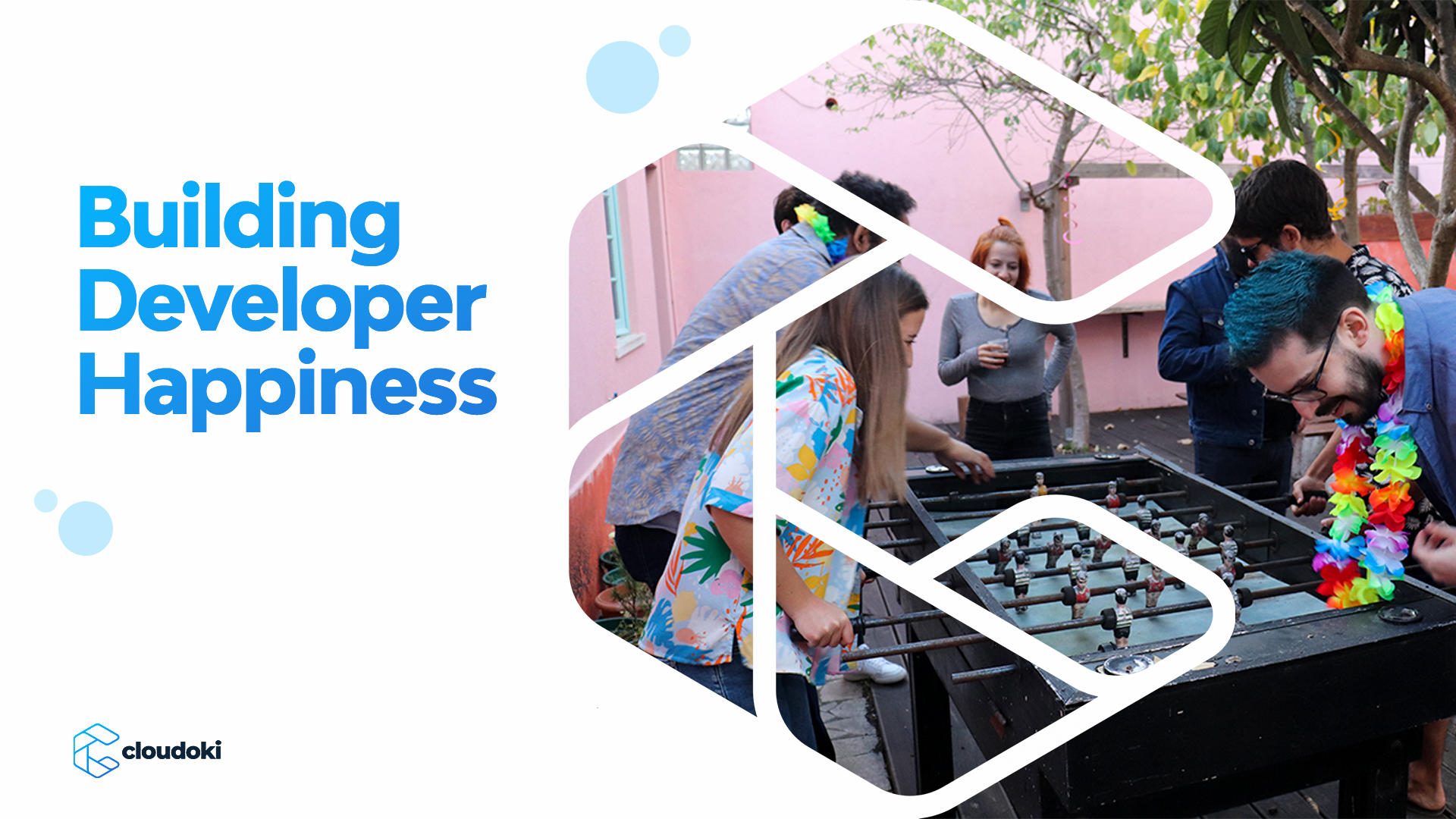What makes a developer happy? It’s a big question, that’s for sure, but that should not undermine its significance. We recently attended a very insightful discussion that asked this very question at Dublin Tech Summit (for more about that event check out API Suite’s excellent recap blog), and it’s something that we’ve all been thinking about. At Cloudoki, we value all of our team members a great deal. We want to ensure that they have the best resources, that they feel comfortable enough to speak their mind if there’s an issue, that they can enjoy a pint after a long days work (even if a virtual one), but most importantly, that they’re happy being part of the family. As team leaders, it is important you look after your team and notice if there are any problems, but as team mates it is essential to ask “Are you OK?”
Now you may be thinking: “Of course my team is happy, we provide our developers with a nice, comfortable salary and a bunch of perks like remote working. Why wouldn’t they be happy?” and that’s understandable to think but let’s be real here, money and casual Fridays are not the be all and end of all of happiness. Depression is a real thing and affects the workplace constantly. If anything, depression has actually increased in the workplace since the start of the COVID-19 pandemic, according to a KFF report.

“Depression is a common illness worldwide, with more than 264 million people affected. Depression is different from usual mood fluctuations and short-lived emotional responses to challenges in everyday life. Especially when long-lasting and with moderate or severe intensity, depression may become a serious health condition. It can cause the affected person to suffer greatly and function poorly at work, at school and in the family.” — Source: World Health Organization
The talk at DTS was absolutely fascinating and really validated what we already instinctively knew about developer happiness. Tyson Singer, VP of Technology and Platforms for Spotify, took to the stage and broke down how all businesses rely on developer effectiveness. Every company builds software that is reliant on human effectiveness. So what happens when human developer effectiveness hits a stand-still? Or even worse, comes crashing down? Well, so does your software and, eventually, your company.
This should be pretty obvious if you think about it. Let’s say you have a bike that you use to cycle to work, exercise and even leisure activities, but never looked after it. You never check your gears or pump your tires. You leave it out in the rain, or throw it into the garage in a damp corner, leaving it to rust. Over time, it will gradually break down and become useless. No more cycling. Sure, you could just simply get a new bike, but that’s just more expenses (and some big expenses too if you want something GOOD). Now think of your bike as your team of hard working developers. The same rules apply.
They are the beating heart of your company and need to be looked after properly.

As shown in the DTS talk, happiness when applied to developer context, means having fulfillment from what they do i.e. creating things by writing code and shipping the product. One of the biggest things that acts as a roadblock in the way of developer happiness is developers are spending less than a third of their time actually writing code. A typical day for a developer can be chaotic.
Unhappy and unmotivated developers are less effective and build worse products. Developers are happiest innovating and writing code. Happiness shapes job market outcomes, productivity, and even firm performance. Thanks to a growing body of research looking specifically at developer happiness, we know today that happy software developers are more productive, write better code and make better decisions.
So how does one enable developer happiness in the workforce?
First you need to identify the signals. Developers that might be ‘slacking off’, in a bad mood, unmotivated and just constantly procrastinating on projects are all obvious signals that something is wrong. Sure, people have their off days and you can always excuse a bad day at work. However, if this is consistently happening for a number of days, or even weeks, and you notice more and more team members are acting in a similar manner then its time to intervene.
Communication is key and to stay ahead of this problem, managers and team leaders need to ensure they’re communicating enough with their developers. Whether that is a simple checkup or even just telling a member “good job” on a small task, communication can go a long way. A study shown in the Developer Happiness Index 2021, developers state that they would “rather work for a good manager but use a bad tech stack” than vice versa.

At Cloudoki, we tackle identifying signals and communication through our monthly 1-on-1’s. Our monthly 1-on-1’s take place with both the HR team and everyone in the team where we try to cover everything. How they’re handling the workload, any news or updates in their lives, making sure the team members are feeling OK and their thoughts or worries are heard.
We really foster communication between each other, it’s what makes our team so strong.
It’s very normal to have someone (not just a team leaders) to flag to us that something is wrong with another team member. Not in a bad, ‘complain-y’ way, but more in a concerned and positive way. We have each others backs and care for each others well-being.
A key aspect of developer happiness is a healthy work-life balance. While this does not simply mean shorter working hours — though that does help, it’s about ensuring your developers know when to shut off from work. Trust and flexibility are significant contributors to a developer’s happiness with work-life balance. Employers should train and encourage supervisors to be positive role models and offer practical and emotional support in work-life balance topics.
A happy workforce is achievable, and everyone deserves to be happy, especially your developers. To reiterate, they are the beating heart of your company and need to be looked after properly. At Cloudoki, we always strive for developer happiness, we’re not just a team but a family. We want to ensure our team always has the best resources, know when to switch off, and have fun. We work smarter, not harder, and end up with amazing results. It’s time to build Developer Happiness in your workforce today.
Related Articles

Building Secure Web Applications in the Age of Cyber Threats: Essential Strategies
Build secure web applications that withstand evolving threats. Learn secure coding practic...
Read more
Infrastructure, Blockchain, and Scalability with Erick Rettozi
In this article, Cyrex' Lead Backend Engineer Erick Retozzi offers expert advice on buildi...
Read more
The Hidden Costs of DIY API Integration: When to Consider Professional Help
Avoid costly mistakes with professional API integration. Learn the hidden costs of DIY API...
Read more
LLMs, the gist
Unlock the magic of Large Language Models (LLMs) with our comprehensive guide. Discover ho...
Read more


